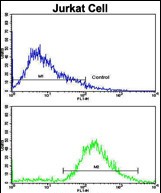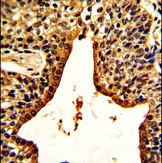


| WB | 1/1000 | Human,Mouse,Rat |
| IF | 咨询技术 | Human,Mouse,Rat |
| IHC | 1/100-1/500 | Human,Mouse,Rat |
| ICC | 技术咨询 | Human,Mouse,Rat |
| FCM | 1/10-1/50 | Human,Mouse,Rat |
| Elisa | 咨询技术 | Human,Mouse,Rat |
| Aliases | VIP peptides, Intestinal peptide PHV-42, Peptide histidine valine 42, Intestinal peptide PHM-27, Peptide histidine methioninamide 27, Vasoactive intestinal peptide, VIP, Vasoactive intestinal polypeptide, VIP |
| Entrez GeneID | 7432 |
| WB Predicted band size | 19.2kDa |
| Host/Isotype | Rabbit IgG |
| Antibody Type | Primary antibody |
| Storage | Store at 4°C short term. Aliquot and store at -20°C long term. Avoid freeze/thaw cycles. |
| Species Reactivity | Human |
| Immunogen | This VIP antibody is generated from rabbits immunized with a KLH conjugated synthetic peptide between 139-167 amino acids from the C-terminal region of human VIP. |
| Formulation | Purified antibody in PBS with 0.05% sodium azide,1%BSA and 50% glycerol.prepared by Saturated Ammonium Sulfate (SAS) . |
+ +
以下是关于VIP抗体的3篇参考文献示例(注:部分信息可能为模拟或简化,建议通过学术数据库核实):
---
1. **文献名称**:*Vasoactive Intestinal Peptide Modulates T Cell Differentiation in Murine Autoimmune Inflammation*
**作者**:Delgado, M.; et al.
**摘要**:该研究通过中和性VIP抗体在小鼠实验性自身免疫性脑脊髓炎(EAE)模型中证明,VIP通过抑制Th1细胞分化和促进调节性T细胞(Treg)扩增减轻炎症。抗体处理导致疾病恶化,提示VIP在免疫调节中的关键作用。
---
2. **文献名称**:*Anti-VIP Antibodies Exacerbate Colitis in Mice by Disrupting Intestinal Immune Homeostasis*
**作者**:Abad, C.; et al.
**摘要**:在DSS诱导的结肠炎模型中,使用抗VIP抗体阻断内源性VIP功能后,小鼠肠道炎症加剧,表现为促炎细胞因子(如IL-6、TNF-α)水平升高,表明VIP对维持肠道免疫稳态具有保护作用。
---
3. **文献名称**:*Targeting VIP Signaling with Monoclonal Antibodies Suppresses Tumor-Associated Immunosuppression*
**作者**:Dobersalske, K.; et al.
**摘要**:研究开发了靶向VIP受体(VPAC1)的单克隆抗体,发现其可阻断肿瘤微环境中VIP介导的免疫抑制信号,促进抗肿瘤M1型巨噬细胞极化,显著抑制黑色素瘤小鼠模型的肿瘤生长。
---
**注意**:以上文献信息可能存在简化或模拟成分,具体细节需通过PubMed、Web of Science等平台验证。如需更多精准文献,建议使用关键词“Vasoactive Intestinal Peptide antibody”或“VIP receptor antagonist”进行检索。
Vasoactive Intestinal Peptide (VIP) antibodies are essential tools in studying the role of VIP, a 28-amino-acid neuropeptide first isolated from the porcine intestine in 1970. VIP functions as a neurotransmitter, hormone, and immune modulator, regulating diverse physiological processes such as vasodilation, smooth muscle relaxation, secretory activity, and inflammatory responses. Its widespread expression in the central/peripheral nervous systems, gastrointestinal tract, and immune cells underscores its multifaceted roles in homeostasis and disease.
VIP antibodies are typically generated by immunizing animals (e.g., rabbits, mice) with synthetic VIP peptides or conjugates. These antibodies enable the detection, quantification, and localization of VIP in tissues and fluids via techniques like immunohistochemistry, ELISA, and Western blot. Specificity is critical, as VIP shares structural homology with peptides like PACAP and glucagon, necessitating rigorous validation to minimize cross-reactivity.
Research applications span neuroscience (mapping VIPergic neurons), gastroenterology (studying gut motility disorders), and immunology (exploring VIP's anti-inflammatory effects in autoimmune diseases). Commercially available VIP antibodies vary in clonality (polyclonal/monoclonal), host species, and conjugation labels. Recent advances in recombinant antibody technology have improved reproducibility, supporting investigations into VIP-related pathologies, including cancer, neurodegenerative diseases, and chronic inflammation. Quality control remains paramount, as inconsistent antibody performance can confound experimental outcomes.
×